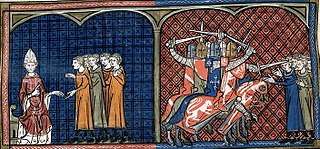Council of Toulouse
The Council of Toulouse (1229) was a Council of the Roman Catholic Church called by Folquet de Marselha the Bishop of Toulouse in 1229 AD. The council forbade laity to read vernacular translations of the Bible.

Background
The Council was called by the local bishop to address the perceived threat from the rapid growth of the Albigensian movement in 13th century southern France. The council resolved that a search in each parish was to be made for heretics (Albigensian[1] and Cathar)[2] and that if found their houses should be destroyed[3] and that non-Latin translations of the Bible be destroyed.[4][5] and likewise for other unauthorised copies.[6][7]
The Council pronounced:
"We prohibit also that the laity should be permitted to have the books of the Old and the New Testament; unless anyone from the motives of devotion should wish to have the Psalter or the Breviary for divine offices or the hours of the blessed Virgin; but we most strictly forbid their having any translation of these books."[8][9]
Legacy
Folquet de Marselha, Bishop of Toulouse died two years latter in 1231, but in 1234 another council was held at Tarragona to regulate the procedure of the Inquisition,[10] which had arrived in Toulouse in 1233.[11] [12]and to also ratify the findings of the Toulouse Council.
Canon two of this Tarragona council restated “No one may possess the books of the Old and New Testaments, and if anyone possesses them he must turn them over to the local bishop within eight days, so that they may be burned…”[13][14]
References
- See Emmanuel LeRoy Ladurie's Montaillou: the Promised Land of Error for a respected analysis of the social context of these last French Cathars, and Power and Purity by Carol Lansing for a consideration of 13th-century Catharism in Orvieto.
- Council of Toulouse 1229, Canon 1.
- Council of Toulouse 1229, Canon 6
- Council of Toulouse 1229, Canon 14.
- Edward Peters, Heresy and Authority in Medieval Europe (Scolar Press, London, 1980), ISBN 0-85967-621-8, pp. 194–195, citing S. R. Maitland, Facts and Documents [illustrative of the history, doctrine and rites, of the ancient Albigenses & Waldenses], London, (Rivington, 1832), pp. 192–194.
- Edward Peters, Heresy and Authority in Medieval Europe, Edited with an introduction by Edward Peters, (Scolar Press, London, 1980) ISBN 0-85967-621-8, p.194–195.
- Pierre Allix, Ecclesiastical History of Ancient Churches of the Albigenses (Oxford at the Clarendon Press, 1821.)
- Edward Peters. Heresy and Authority in Medieval Europe (Council of Toulouse, 1229, Canon 14), p. 195.
- The Bible Forbidden to the Laity at just for catholics.org
- ARCHDIOCESE OF TARRAGONA (TARRACONENSIS) at newadvent.org.
- Angus MacKay, David Ditchburn, Atlas of Medieval Europe, p. 124.
- Malcolm D. Lambert, The Cathars (Wiley, 1998) p25.
- The Church Council of Tarragona (1234 AD), 2nd Cannon.
- D. Lortsch, Historie de la Bible en France, 1910, p.14.
.jpg)